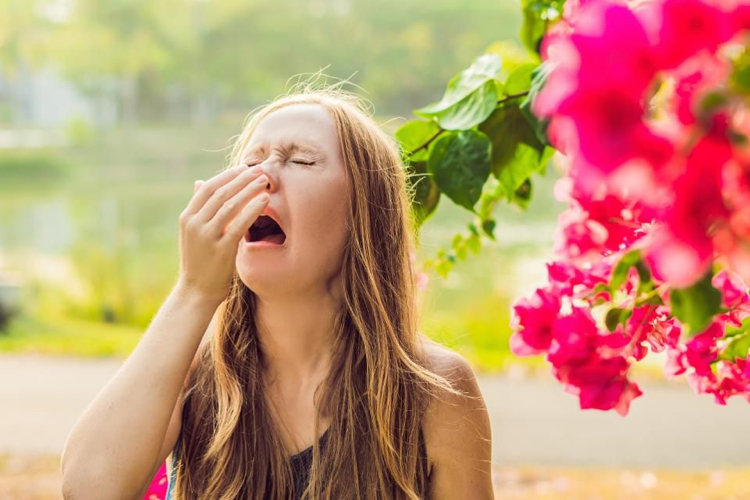Dry nose: Tips for nasal care and home remedies that help with dry nasal mucosa
Sneezing, itching and burning sensations: Those who have a dry nose know the symptoms too well. Both in winter and in summer, the nasal mucosa can dry out under the influence of weather or as a result of an illness. And a dry nasal mucosa can no longer fulfill its perhaps most important task, namely to protect it from bacteria and viruses. Then dirt particles and pathogens can infect the nasal mucosa. We give you tips on nasal care that you can use to ensure a good nose climate and explain which home remedies really work.
What can cause a dry nose?

The nasal mucosa is a complicated organ with an important task: it warms up our breathing air when it is cold outside. The humidified, cleaned and warm air can reach our lungs faster. Together with the nasal hairs, the nasal mucosa fulfills another function: it filters out dirt particles, poles, viruses and bacteria. A dry nose quickly leads to the formation of less mucus film, which can protect us from harmful pathogens and dust. The consequences are not long in coming: If the protective barrier does not work properly, there is inflammation, nasal congestion and unpleasant sensations. That is why it is important to moisturize the nasal mucosa. Most doctors recommend not treating the dry nose as a temporary symptom that goes away on its own, but to treat it in good time. Fortunately, there are plenty of tricks and home remedies that can help with a dry nose. However, it is important to know the exact cause of the dry nasal mucosa. We list several possible causes:

1. Weather and indoor climate: Dry air is the most common cause of dry nasal mucosa. But strong winds can also help. Surprisingly, both the cold air at sub-zero temperatures and the hot air at over 30 ° Celsius can have a negative effect on the sensitive organ. A dry nose in winter is therefore not uncommon for most people, especially because the indoor air is usually too dry inside and the wind whips the cold air outside on the face.
2. Whoever cleans his nose too often removes the protective layer from the nasal mucosa and prevents a new protective barrier from forming. That is why it is important to have the right nasal care, it guarantees that the nasal mucosa remains moist. It is not advisable to overdo it. We explain below what the right nose care entails.

3. Allergy sufferers often have a dry nose. The affected person's immune system is too sensitive to poles, dust and other stimuli. Allergic rhinitis is often seasonal and occurs in most people in spring and late summer when the pollen flies through the air. The result is annoying hay fever, which is treated with special medications that are prescribed by the doctor.
4. Runny nose for diseases of the upper respiratory tract. Runny nose in spring and summer indicates an allergic reaction, but in winter the reason is usually different. Many viruses circulate annually, which can cause diseases of the upper respiratory tract. A symptom of this is the runny nose, which usually does not last more than a week. In this case, too, the moist nasal mucosa plays a decisive role and can also accelerate the improvement.

5. For many women, the dry nose is one of the menopausal symptoms. During this period, the estrogen level drops and this can cause a dry nasal mucosa. If your nose becomes blocked as a result, only home remedies and certain nasal sprays can help.
6. If you suffer from a lack of fluids, you often have to fight with a dry nose. If the body is not adequately supplied with water, then it cannot form a moist protective layer. The nose dries up and we are much more susceptible to pathogens.
7. Dry nose can also have other causes, mostly as a symptom of an impaired function of the thyroid gland. If this is the case, then it is important to see a doctor and seek advice. Even if the nasal congestion itself is only a temporary complaint, treatment of the disease is often necessary.
Dry nose, what to do?

The first step to alleviating the complaint is to identify the dry nose cause early on. Only then can you properly treat the symptom. We will explain how you can identify the cause yourself and when you need to see a doctor. We also offer several recipes for home remedies that can help you.
If you feel dry nasal mucosa on the inside, it may be due to the heating

If the nasal mucous membrane only dries out in winter, it can be due to the weather and the heating air. In these cases, a humidifier can help. And even if the dry nose only occurs at night, you should also humidify the air in the room during the day in winter. Because it really doesn't help if your nasal mucous membrane dries out all day in the office and then you turn on the humidifier at home for 1-2 hours in the evening. Optional also helps if you put a pot of water on the heater. There are two ways out: You can either find a compact humidifier for the table in the trade or you can inhale steam with salt water or herbs in the evening. Regular ventilation in the cold season can also help. This is where you can ventilate, where you open the windows wide for a short time. Ventilate every 3-4 hours for the best possible results. In addition, you should make sure that the room temperature in the living area between 20 ° and 23 ° Celsius, and in the bedrooms the room temperature should be between 18! and 20 °.
If you feel the stuffy nose outside when you go for a walk, especially in winter: it can be due to the cold air and the wind

What to do if your nose is dry and only happens after a walk in the cold season? You can protect your nose from the cold air by wrapping your scarf around your mouth. You can also treat the dry nose with olive oil on the inside. Drip 3-4 drops of olive oil into your nose before going out and gently press your nostrils. Try to make a smooth transition between cold and warm in your own home. For example, you can set the heater to 20 ° Celsius before going out.
If you have an allergy, the doctor can prescribe medication to relieve the discomfort. Decongestant nasal sprays usually help, but you can take them for a maximum of 5-6 days. After that, there is a risk that the body will slowly get used to its active ingredients. After therapy, you can moisten the nasal mucosa with home remedies. Allergy sufferers should also drink more water – i.e. 2 liters a day. The reason for this is very simple: your nose dries out faster if you suffer from hay fever. In order for the nasal mucosa to recover and to form a new protective layer, it needs liquid.
The right nose care for colds

If you have a cold, you can wait 3-4 days and see if the symptoms go away on their own. However, if you have a dry nose for more than a week that feels blocked at the same time, you should seek advice from your doctor. He can best judge whether the reason for this is the cold itself or a bacterial infection. Even if your smell also decreases or your nose bleeds, you should definitely consult a doctor. A nasal rinse with salt water can now alleviate the symptoms.
Dry nose at night: what you can do to prevent dry nasal mucosa at night
If you have a dry nose at night, you should consider whether the room temperature is really appropriate. Two possible reasons for the dry rabbit mucosa are: 1) A cold 2) Air that is too dry. These little tricks will help you. Ventilate the room before going to bed and set the thermostat to level 2 (room temperature between 16 ° and 20 ° Celsius)
Dry nose in babies: saline can help

Babies and toddlers often get a dry and stuffy nose because the connecting passages between the ears and nose are still too narrow. Whenever the little ones have a cold, and unless the doctor has recommended otherwise, you can make a saline solution yourself. Put 1 liter of water in a saucepan and bring to a boil. Let the water boil for 5 minutes and then add 1 teaspoon of salt. Take the pot off the stove and let the saline cool down at room temperature. Then fill them into dropper bottles and drip 1-2 drops into the baby's nose. So that the nasal mucosa does not dry out from the solution, you can feel 1 bowl with lukewarm water and place it on the heater. You can also use humidifiers, or take the baby to the bathroom and let hot water run in the shower area. Never wash the baby with the hot water, otherwise there is a risk of burns! The child should only inhale the steam for several minutes.
Dry nose: home remedies that really help

First clean the nose with a nasal douche. Rinse them with a salt water rinse to free them of dirt and excess mucus. You can also find nasal sprays with sea water in pharmacies, which are particularly effective and have a slight antibacterial effect. Most of these sprays are suitable for daily use because they contain no other active ingredients apart from sea salt. But don't overdo it – clean your nose 2-4 times a week. Take regular 10-day breaks to help your mucosa recover. If you have a cold, a nasal douche is not recommended, but allergy sufferers find it very helpful.
Olive oil can help with a dry, crusty nose. Put 1-2 drops in the nose and massage the nostrils. You should not use olive oil with nose drops as it may reduce their effectiveness.

Drink 4-5 cups of herbal tea for colds daily. Try to breathe in the steam from the tea first and then drink the tea. Try to provide your body with enough water. Especially for colds you need 1.5 – 2.5 liters of water a day.
The air humidity in the bedroom should be between 60% and 70%. The fastest way to regulate it is with a humidifier, but you can also place several wet items of clothing in the bedroom in front of the heater.
Indoor plants can regulate the indoor climate. They provide air humidification in a natural way because they drain the irrigation water back into the room. They also filter out existing toxins from the air. The suitable plant species are usually evergreen exotic species such as the bamboo palm, the dragon tree or the birch fig. They are fairly easy to maintain and undemanding in terms of location. That is why they are suitable for large living areas as well as for small living rooms. In the bedroom you can place an orchid on the bedside table or on the windowsill. Unlike the other plants, it releases oxygen at night and absorbs CO2. So you can enjoy a healthy sleep.
The post Dry Nose: Tips for nasal care and home remedies that help with dry nasal mucosa appeared first on Deavita.com | Living ideas, design, hairstyles, make-up, lifestyle, health and beauty tips.





















